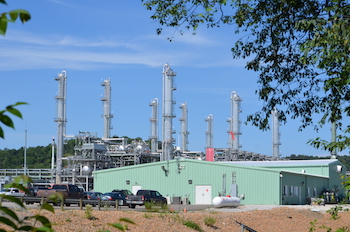Cracker plants
Cracker plants use heat to break the molecular bonds of ethane and create ethylene, the building block of plastics, adhesives, synthetics, and other petrochemical products. As shale gas production expands in the United States, cracker plants are gaining more attention and investment, including for controversial projects in the Marcellus and Utica Shale.
Compressed Natural Gas (CNG) plants
Compressed Natural Gas (CNG) plants dehydrate, compress, and cool natural gas to create a transportation fuel. This process greatly reduces the volume of gas; CNG has to remain under high pressure while it is stored, transported, and used. CNG is marketed as an alternative to oil-based gasoline because motor vehicles running on it pollute less. Although consumption of CNG has increased, it still accounts for less than 2% of all natural gas use.

Fractionator plants
Fractionator plants break apart NGLs so they can be used in a range of industries. Fractionation is based on the different heating and freezing points of each NGL. The process and equipment used varies depending on the specific NGL, such as de-ethanizers (for ethane) or de-propanizers (for propane).
Liquefaction plants
Liquefaction plants super-cool gas until it becomes Liquefied Natural Gas (LNG), which is the form in which natural gas can be transported long distances. LNG has to be stored and transported at very cold temperatures and then turned back into a gas for most uses.
The US has long imported LNG from other countries, but the domestic shale gas boom has created an industry and political push to export it. This has raised concerns about increasing domestic health and environmental impacts of natural gas production to satisfy an export market, as well as the energy demands and pollution of LNG facilities themselves. Unlike other types of processing facilities, LNG terminals are permitted and overseen by the Federal Energy Regulatory Commission (FERC).
For More Information
- Sierra Club report on the environmental impacts of increasing LNG production and export
- Federal Energy Regulatory Commission information on LNG facilities and regulation
- Food & Water Watch How fracking supports the plastics industry
